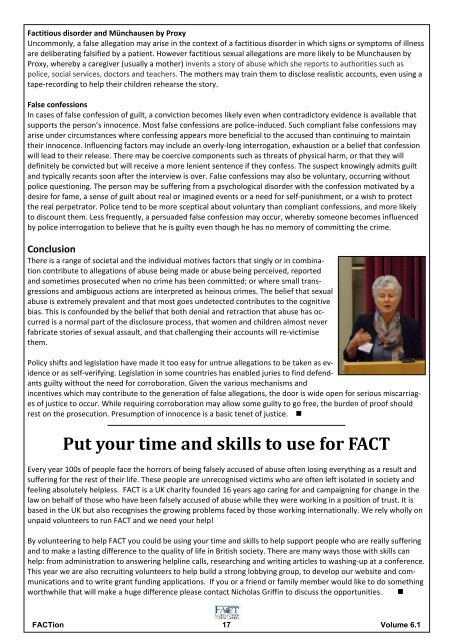FACTion-6.1-web-version
FACTion-6.1-web-version
FACTion-6.1-web-version
You also want an ePaper? Increase the reach of your titles
YUMPU automatically turns print PDFs into web optimized ePapers that Google loves.
Factitious disorder and Münchausen by ProxyUncommonly, a false allegation may arise in the context of a factitious disorder in which signs or symptoms of illnessare deliberating falsified by a patient. However factitious sexual allegations are more likely to be Munchausen byProxy, whereby a caregiver (usually a mother) invents a story of abuse which she reports to authorities such aspolice, social services, doctors and teachers. The mothers may train them to disclose realistic accounts, even using atape-recording to help their children rehearse the story.False confessionsIn cases of false confession of guilt, a conviction becomes likely even when contradictory evidence is available thatsupports the person’s innocence. Most false confessions are police-induced. Such compliant false confessions mayarise under circumstances where confessing appears more beneficial to the accused than continuing to maintaintheir innocence. Influencing factors may include an overly-long interrogation, exhaustion or a belief that confessionwill lead to their release. There may be coercive components such as threats of physical harm, or that they willdefinitely be convicted but will receive a more lenient sentence if they confess. The suspect knowingly admits guiltand typically recants soon after the interview is over. False confessions may also be voluntary, occurring withoutpolice questioning. The person may be suffering from a psychological disorder with the confession motivated by adesire for fame, a sense of guilt about real or imagined events or a need for self-punishment, or a wish to protectthe real perpetrator. Police tend to be more sceptical about voluntary than compliant confessions, and more likelyto discount them. Less frequently, a persuaded false confession may occur, whereby someone becomes influencedby police interrogation to believe that he is guilty even though he has no memory of committing the crime.ConclusionThere is a range of societal and the individual motives factors that singly or in combinationcontribute to allegations of abuse being made or abuse being perceived, reportedand sometimes prosecuted when no crime has been committed; or where small transgressionsand ambiguous actions are interpreted as heinous crimes. The belief that sexualabuse is extremely prevalent and that most goes undetected contributes to the cognitivebias. This is confounded by the belief that both denial and retraction that abuse has occurredis a normal part of the disclosure process, that women and children almost neverfabricate stories of sexual assault, and that challenging their accounts will re-victimisethem.Policy shifts and legislation have made it too easy for untrue allegations to be taken as evidenceor as self-verifying. Legislation in some countries has enabled juries to find defendantsguilty without the need for corroboration. Given the various mechanisms andincentives which may contribute to the generation of false allegations, the door is wide open for serious miscarriagesof justice to occur. While requiring corroboration may allow some guilty to go free, the burden of proof shouldrest on the prosecution. Presumption of innocence is a basic tenet of justice. •Put your time and skills to use for FACTEvery year 100s of people face the horrors of being falsely accused of abuse often losing everything as a result andsuffering for the rest of their life. These people are unrecognised victims who are often left isolated in society andfeeling absolutely helpless. FACT is a UK charity founded 16 years ago caring for and campaigning for change in thelaw on behalf of those who have been falsely accused of abuse while they were working in a position of trust. It isbased in the UK but also recognises the growing problems faced by those working internationally. We rely wholly onunpaid volunteers to run FACT and we need your help!By volunteering to help FACT you could be using your time and skills to help support people who are really sufferingand to make a lasting difference to the quality of life in British society. There are many ways those with skills canhelp: from administration to answering helpline calls, researching and writing articles to washing-up at a conference.This year we are also recruiting volunteers to help build a strong lobbying group, to develop our <strong>web</strong>site and communicationsand to write grant funding applications. If you or a friend or family member would like to do somethingworthwhile that will make a huge difference please contact Nicholas Griffin to discuss the opportunities. •<strong>FACTion</strong> 17 Volume <strong>6.1</strong>


